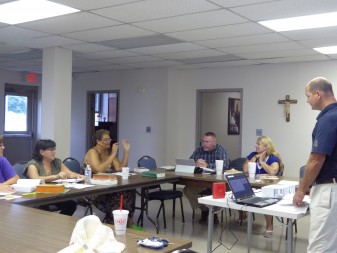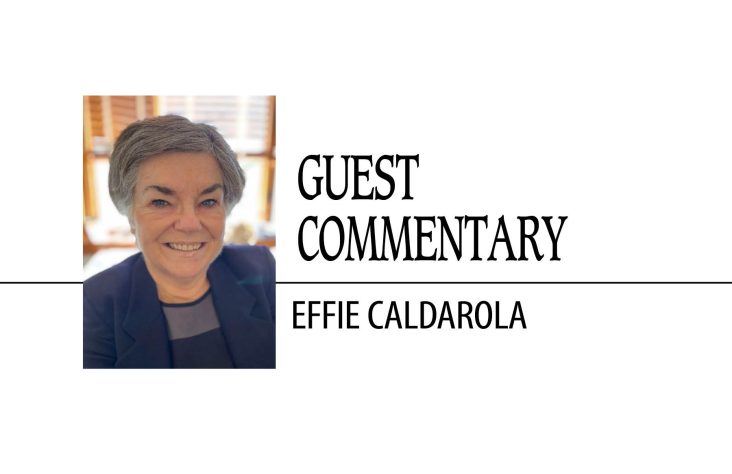September 28, 2016 // Uncategorized
Education for Ministry: educating catechists for life

Intro to the Creed is one of many courses offered in the Education for Ministry Program. Instructor Joe Miller explains the names of the Holy Spirit during the Intro to the Creed course.
By Jennifer Miller
In a profession focused on giving, it is rare that teachers and lay ecclesial ministers are offered the opportunity to freely receive. But the Education for Ministry Program, through the Office of Catechesis, provides just that. For the past 25 years, the Office of Catechesis has offered excellent, high-quality, free continuing education theology courses to teachers, directors of religious education, homeschooling parents, and anyone involved in active ministry looking to learning more about their faith.
Four years ago the program was revamped, becoming more accommodating to working ministers and religion teachers in the Diocese of Fort Wayne-South Bend in terms of requirements and scheduling to complete the certification. Essentially a baseline of faith formation, the Education for Ministry Program was focused for Catholic school teachers and is still required for their full certification. Courses are offered on a rotating basis, twice through the year, in the basics of prayer, sacred Scripture, the sacraments, ecclesiology, the creed, catechesis and the moral life.
Marsha Jordan, superintendent of Catholic schools, explained: “By their witness and their behavior, teachers are of first importance to impart the distinctive character of Catholic schools. It is essential, therefore, to ensure their continuing catechetical formation. The Education for Ministry Program provides a means to ensure that teachers are well prepared with the requisite knowledge to hand on the faith to our children.”
“I truly enjoyed the Education for Ministry Program,” recalled Kelly Pant, director of religious education and youth minister at Queen of Peace Parish, Mishawaka. “It’s a unique experience to gather together with your peers who are in classrooms or teaching religious education, learn new information and discuss different challenges in your own ministry.” Pant completed the two-year certificate program this spring.
“We basically covered the entire Catechism of the Catholic Church in the eight different classes. We pulled apart the Ten Commandments. We really dove into the senses of scripture, information which I could take back to my religious education class. We tried different types of prayer and learned the prayer type for our personality, which was enlightening. We also learned about the rubrics the Church has for the different sacraments and what each sacrament needs for it to be valid; this really helped in understanding the differences between the catechumens and candidates for RCIA.”
“Many of the things we learned were things I was already teaching about, but it was on another level. I would definitely suggest for other catechists to take these classes to grow their own faith. The Office of Catechesis is very understanding and accommodating with registering and payment; it was a joy to work with them and the catechists,” Pant added.
Secretary for Education Carl Loesch described a similar experience.
“Perhaps the key impact on the diocese that I have seen is catechists and teachers who have a strong desire to share the faith either in their school classroom or in their religious education classroom are given the necessary background knowledge to share the fullness of the faith. Having the desire to catechize and evangelize others is great, but we all need to continue to grow in our understanding of the faith so that we can pass it on to others. I was personally blessed to participate in the creed course taught by Dr. John Cavadini. He is an outstanding teacher who seamlessly blended prayer, history, doctrine and art. Each class felt like a mini-retreat.”
Instructors of the classes also report the same. “Sharing the Church’s teaching on prayer with fellow teachers and catechists has brought me immense joy. Partaking in the experience with them has not only further opened my own heart and mind to God, but their profound faith, love for Our Lord and dedication to their students impacts the teaching in my own classroom at Saint Joseph High School,” explained Jeanette McKew, who has taught with the program since 2015 and is a theology teacher at Saint Joseph High School, South Bend. “Together, we have the opportunity to share experiences of our own prayer lives as well as ideas for teaching our students. This affects the way we minister to our students because it increases our ability to assist them as they journey toward a deeper relationship with God. Indeed, these beautiful men and women — these great teachers and catechists — are a gift to me.”
Jennifer Carrier, another Education for Ministry instructor who is also a theology teacher at Saint Joseph High School, described her time teaching as “stimulating and inspirational.”
“Instructing people who are committed to Catholic education in the diocese required me to consider my own faith more deeply, which reinforced my knowledge and, at the same time, allowed me to share the beauty of the Catholic faith and my practice of it with others involved in catechesis and evangelization at a variety of levels. I was inspired by the interest these searchers showed in discussing the teachings of the Church and by their witness to the faith in their lives inside of and outside of their respective classroom settings.”
The potential exists for the content of the Education to Ministry Program to continue growing. A second level of certification for advanced theology, such as in-depth topics of liturgy or morality, may be added in the future.
To register for upcoming classes, contact the Office of Catechesis at 260-399-1411 or on-line at www.diocesefwsb.org/Education-for-Ministry-Program.
The best news. Delivered to your inbox.
Subscribe to our mailing list today.






